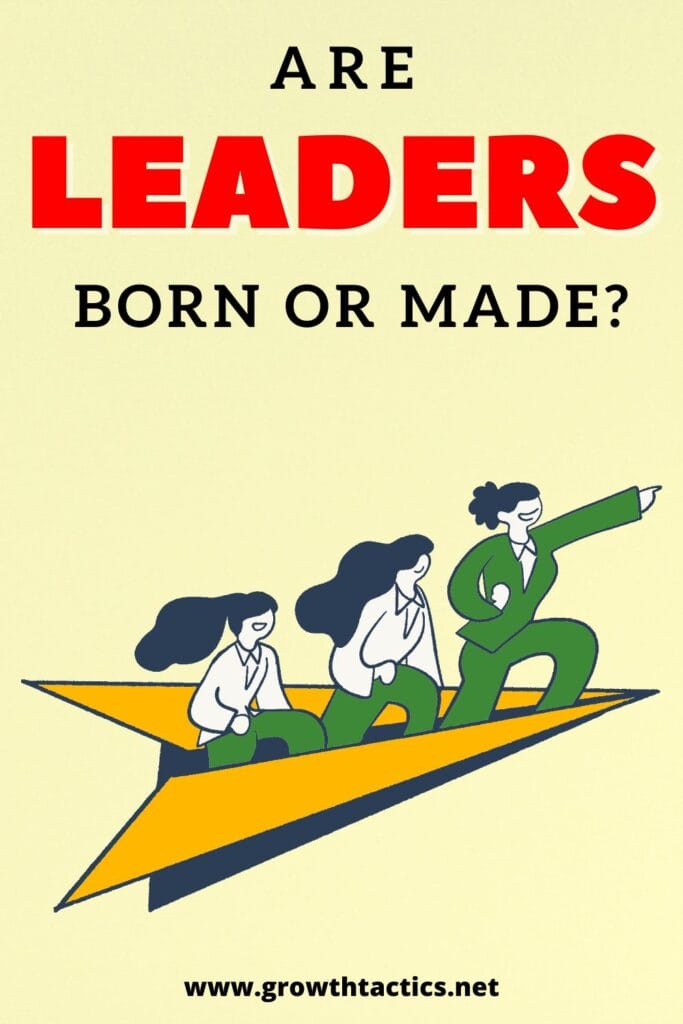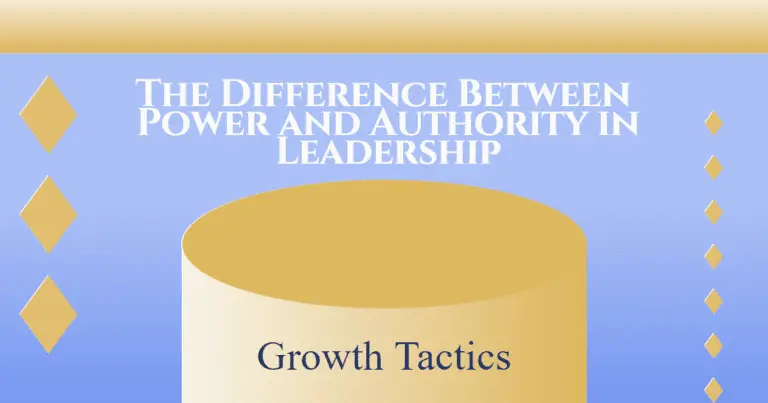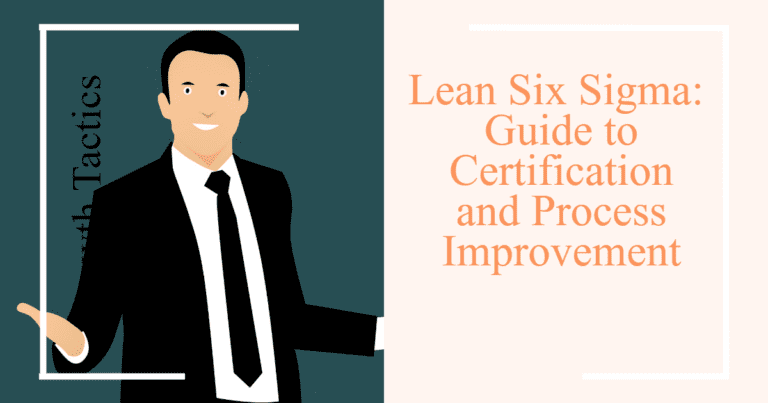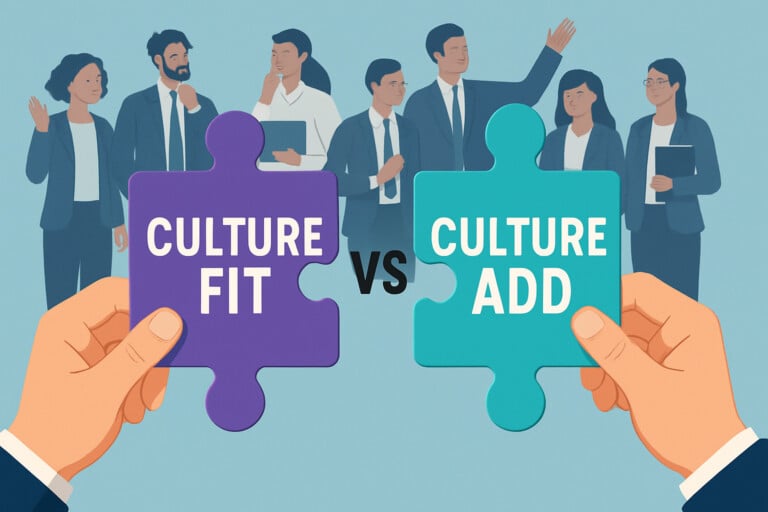Are leaders born or made? This question has sparked debates for ages. Some argue that great leaders are born with natural talents that set them apart. Others believe that anyone can become a leader through hard work and dedication.
The truth lies somewhere in between.
While some people have innate leadership abilities, many leadership skills can and must be learned. This blend of nature and nurture shapes effective leaders who inspire and guide others. So, let’s explore how both natural traits and learned skills play a role in leadership development.
Jump To Section
The Perspective that Leaders are Born
Many people believe that leaders are born, not made. They think certain individuals have natural talents that make them stand out as leaders from a young age. These “born leaders” often show traits like confidence, charisma, and decisiveness without much effort.
Natural Charisma
Take charisma, for example. Some people seem to naturally draw others to them. They capture your attention when they talk and make you feel excited about their ideas. This magnetic charm can seem like a gift they were born with.
Innate Confidence
Confidence is another key trait. Born leaders often appear self-assured, even in tough situations. They tackle challenges head-on and inspire others to follow their lead. You might notice how some people exude this kind of confidence naturally, making it seem like they were always meant to be leaders.
Quick Decisiveness
Let’s not forget decisiveness. Born leaders usually have a knack for making quick, effective decisions. They weigh their options fast and pick the best course of action without much hesitation. This decisiveness can set them apart, especially in high-pressure situations.
Examples of Born Leaders
Look at historical and modern examples like Martin Luther King Jr., Mahatma Gandhi, or Steve Jobs. These individuals exhibited strong leadership qualities from early on, making it easy to argue that they were born with something special.
The Balance
But remember, believing that leaders are born doesn’t mean others can’t develop leadership abilities. It’s about recognizing that some people might have a head start thanks to their natural traits. However, as we’ll discuss later, there’s a lot that hard work and learning can do to make better leaders out of anyone.
In essence, while some people are born with a bit of a leadership spark, it doesn’t mean the rest of us can’t light up and shine too!
The Perspective that Leaders are Made
On the flip side, many believe that leaders are made, not born. This view holds that anyone can become a leader through hard work, training, and experience. Let’s dive into how developing leadership skills can turn anyone into a great leader.
Leadership Training and Development
First off, let’s talk about training. Many organizations offer leadership development programs that teach essential skills like communication, problem-solving, and team management. Through these programs, people learn how to motivate others, handle conflicts, and make effective decisions. It’s incredible how much someone can grow with the right guidance and education.
Acquired Leadership Skills
Think about skills like active listening and empathy. These are not traits you’re born with but can be taught and practiced. By paying attention to others and understanding their perspectives, you can become a more effective and compassionate leader. These skills build over time and prove that leadership isn’t just about natural talent.
Personal Development and Growth
Personal development plays a huge role, too. Many successful leaders share stories of how they weren’t always confident or decisive. Through experience, feedback, and self-reflection, they learned and grew into their roles. This growth mindset shows that even if you start from scratch, you can become a leader by continually improving yourself.
Real-Life Examples
Take someone like Sheryl Sandberg, COO of Facebook. She wasn’t always the powerhouse leader she is today. Through years of building her skills and gaining experience, she became a vital part of one of the world’s biggest companies. Her story demonstrates that dedication and effort can make a leader out of anyone.
The Power of Effort
At the end of the day, the idea that leaders are made is all about the power of effort and resilience. You don’t need to have a natural ability to become a leader. With the right mindset and resources, you can pick up the skills you need and thrive in a leadership role.
In summary, while some might have a knack for leadership from the get-go, anyone can rise to the occasion with hard work and the right opportunities. So, even if you don’t see yourself as a “born leader,” remember that you have the potential to become one through dedication and learning.
Research and Studies on Whether Leaders are Born or Made
The debate over whether leaders are born or made isn’t just a matter of opinion; there’s a lot of research digging into this question.
Interestingly, some studies suggest that both genetics and environment are important. Researchers from the University of Minnesota conducted a study that indicates leadership is about 70% learned and 30% inherent. This balanced perspective highlights that while some people might start with a natural talent, the majority of leadership ability comes from practice and education.
So, what does the research say? Well, it’s a bit of both. Some people may have a natural predisposition for leadership, but most leadership skills are developed through experience, training, and personal growth. Whether you’re a “born leader” or working to become one, the evidence shows that there’s a path for everyone to lead effectively.
Practical Applications
Knowing that both natural traits and learned skills can contribute to effective leadership is great, but how do we apply this knowledge in real life? Let’s look at some practical steps you can take to enhance your leadership skills.
Take Leadership Courses
First up, consider enrolling in leadership courses or workshops. Many organizations and online platforms offer programs specifically designed to build leadership skills. These courses cover topics like communication, team management, and decision-making, helping you become a more effective leader.
Example: Websites like Coursera and LinkedIn Learning offer comprehensive leadership programs that you can complete at your own pace.
Find a Mentor
Another practical step is finding a mentor. A mentor with experience in leadership can provide valuable insights, offer feedback, and guide you through challenging situations. This relationship can fast-track your growth and help you avoid common pitfalls.
Tip: Look for mentors within your organization or professional network who have the qualities you admire and respect.
Practice Active Listening
One of the simplest yet most impactful skills you can develop is active listening. Make a conscious effort to listen to your team members, understand their perspectives, and show empathy. This builds trust and fosters an environment where people feel valued.
Quick Exercise: When someone speaks to you, focus entirely on what they are saying without thinking of your response. Nod, make eye contact, and summarize their points to show you’re listening.
Take on Leadership Roles
Don’t wait for the perfect leadership opportunity to come along. Proactively seek out small leadership roles, whether it’s leading a project, organizing an event, or heading a small team. These experiences add up and build your confidence over time.
Advice: Volunteer for team lead positions, join committees, or even start small initiatives in your community. Each experience counts.
Reflect and Learn
Finally, make reflection a habit. After leading a project or handling a challenging situation, take time to reflect on what went well and what could be improved. Learning from both successes and failures is crucial for continuous growth.
Tool: Keep a leadership journal where you jot down your experiences, lessons learned, and areas for improvement. Review it regularly to track your progress.
Conclusion
By combining natural traits with learned skills and actively seeking out opportunities to lead, anyone can grow into a strong leader. Whether you take courses, find a mentor, practice active listening, take on leadership roles, or reflect on your experiences, these practical steps will help you on your journey to becoming an effective leader.
So, start today and immerse yourself in the process of becoming the best leader you can be!








